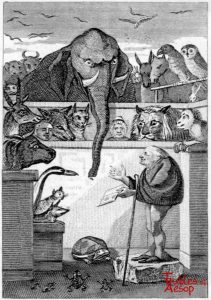Aesop was on trial for animal libel. The animals eventually agreed his writings were correct so Aesop was freed.

Jefferys Taylor
BUT the beasts and the birds, and the flocks and the herds,
And the frogs, and the toads, and the mice;
And the trees, and the fishes, the pots, and the dishes.
Ants, earwigs, snails, spiders, and flies,—
These perceiving, at test, what a scandal was cast
Upon them, by what Aesop recited,
All muster’d their strength, and determined, at length,
For a libel to have him indicted.
So the court was conven’d and each witness subpoen’d;
The judge and the jury attendant;
And there all alone, mounted up on a stone,
Stood poor Aesop, the hapless defendant.
Said the judge, “we’ll proceed this production to read,
That the jury may well understand;
And then leave it to them to acquit or condemn,
As strict justice they think may demand.”
So when this he had said, a few pages he read,
Nor had finish’d the volume or near it,
When the plaintiffs and jury all rose in a fury,
And vow’d they’d not tarry to hear it!
But, who can disclose such a scene as arose,
The barking, the groans, and the hisses!
For, said they one and all, both the great and the small,
“Who’s to bear such a scandal as this is?”
Said the fox, “Its absurd! I ne’er spoke such a word;”
Said the frogs, “We ne’er held such a tenet;”
Said the ass, “Could I try on the skin of a lion?
What a fool he must be who could pen it!”
Said the wolf, “It must follow, with bones in my swallow,
I ne’er could have made that oration;”
Said the crane, “Without doubt, if the bone I’d pull’d out,
You’d have made me a due compensation,”
“Indeed,” said the bear, “it’s too bad, I declare,
To assert that I crush’d his proboscis;
I have something to do of more consequence too,
Than to brush away flies from their noses!”
Said the jury, “So clear does the libel appear,
Further evidence cannot be needed;”
Then the judge turn’d his head towards Aesop, and said,
“Your defence may directly be pleaded.”
Then said he, “I assure ye, my lord and the jury,
The whole is a false accusation;
‘Tis a libel on me, which I hope all will see
Who compose this august convocation.
“For know, one and all, both the great and the small,
Of these faults you were never suspected;
They are not in the least meant to censure the beast,
But the whole at our race is directed.
“Now, if in my book with more care you will look,
You must see what 1 mean, I’m persuaded;
Seeing all the way through, I have labour’d to show
How far below you we’re degraded.
“Just hear, I would pray, what those animals say
We call donkeys,—I hope no offence;
When they’re talking together concerning the weather,
Of instinct, wit, reason, and sense.”
Then the fable in question, at Aesop’s suggestion,
Was read, (for they could not deny it);
When the beasts of all classes, especially asses,
Felt perfectly satisfied by it.
Said the judge, “What you state, I confess, has some weight,
Your defence may, I think, be admitted;”
Said the jury, “If so, the defendant may go;”
And old Aesop forthwith was acquitted.
To ourselves, it’s confess’d, are these fables address’d ,
‘Tis a fact not to meet with denial;
And that this may be known by all readers, I own,
Is the reason I’ve publish’d the trial.
